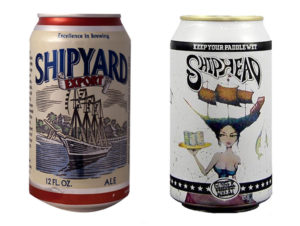For all our fellow Logboat lovers out there: if you haven’t heard, Shipyard Brewing in Portland, ME, is suing Logboat Brewing Company in Columbia, MO over its Shiphead Ginger Wheat beer. The brewery claims the use of the name, logo and packaging colors of the wheat beer resemble Shipyard’s brand. According to the lawsuit documents, Shipyard states that the beer is “nearly identical,” to Shipyard’s trademark.
This is like your senile aunt telling you at EVERY family function that you’re the spitting image of your distant cousin Harold who you’ve never even met before.

The similarities are clearly there:
- It’s got a ship on it
- It has the word “ship” on it
- It’s a beer
- It’s in a can
Ahem. Not exactly a carbon copy. (Photo via Columbia Missourian, courtesy of All Grain Beershop, left and Friar Tuck, right)
The Frivolous Claim
From our perspective, the claim is simply preposterous. Let’s take a moment to mill through the minutiae of the case and debunk it from a branding standpoint.
- The Ship
Yes, we see the ship on both cans. They both appear to be schooners as well. However, on the Logboat can, you can see how the artist has weaved the schooner into the woman’s hair, distorting the shape and making the actual type of ship much harder to distinguish. That said, the angle is different and the style of illustration is clearly distinct. - The Name
According the US Patent and Trademark Office, the name “Shiphead Ginger Wheat” was filed for trademark in February of 2014 and approved in July 2015. NEVER during that registration process was Logboat’s mark ever challenged – even though Shipyard has been around much longer than Logboat. Try more than 20 years longer. Shipyard didn’t even try to trademark “Shiphead” until May of 2016 - The Logo
Where do we even begin? The fonts are completely different, where the Shiphead font looks more manipulated (note the whale tail on the S) than the traditional, bold font that Shipyard uses. - The Can
This is probably the main aspect that sets the brands completely apart from one another. Logboat’s can looks like a modern twist on steampunk, whereas Shipyard’s can looks much more colonial and resembles the Americana feel that Yuengling, Budweiser and other large brands have used throughout the years. - The Colors
This just leaves us at a total loss of words. We have a team member who is totally color blind and he could even tell you that there are absolutely no similarities.
In response to the lawsuit, Logboat released the following statement via Facebook on May 16:
“In response to the civil action filed against us this week for the use of our Shiphead trademark (registered on July 21st, 2015) we offer the following comment: Logboat denies that its SHIPHEAD mark infringes any trademark rights of Shipyard Brewing Company. Logboat’s SHIPHEAD GINGER WHEAT trademark was registered by the U.S. Patent and Trademark Office following examination by a Trademark Examiner, and successfully passed through the public opposition phase. Logboat’s mark was never challenged during the registration process as being likely to cause confusion with the trademark of any other party.”
Further, Wier & Bein’s internal research shows:
- Logboat filed its trademark in February 2014, about two months prior to its claimed first use in commerce of April 2014
- The USPTO granted registration about eighteen months later, in July of 2015
- Shipyard filed its trademark claim in June 2016 nearly a year after Logboat’s trademark was registered, and has never claimed any use in commerce.
The Blow Back
Since news of the suit began to spread, the people of Columbia (along with Logboat fans across the country) have rallied the troops. Numerous 1-star reviews and negative posts and comments have bombarded Shipyard’s Facebook page, as if the people of Columbia have turned the tables on a big, bad, schoolyard bully.
For your convenience and laughing pleasure, we’ve included a snapshot below.
The Importance of Customer Loyalty
We at W&B certainly understand the importance of branding, and the impact good (or bad) branding will have on the success of a beer. After all, marketing is not a battle of products and services, but rather a battle of perceptions in the minds of the consumers (see The 22 Immutable Laws of Marketing).
As we know the legal perspective will be debated thoroughly, we’ll prefer to take a different approach to the dialogue. We suggest you look at this from a branding point of view, rather than a legal. In life, everything is a popularity contest, which is the purpose of good branding and good marketing, as well as good product.
Our questions to you are these:
- If you filed a suit against a competitor, how would your customer respond?
- How would your competitor’s customers respond?
- If a competitor filed a suit against you, how would your customers respond?
- How would your competitor’s customers respond?
If you’re not certain of the answers the questions above, call Wier & Bein today. For in the end, it is the court of public opinion that will have the final word.





If you want people to drink your beer, make good beer.
It seems fairly straightforward.
If you have the resources to spend on trademark trolling lawsuits, why not invest that money in better product development instead? That benefits your customers (and society, and the craft beer industry) more than the money thrown away on lawyers.
It’s just such an INCREDIBLE reach to compare the two beers. Karma will get the folks who chose to attack Logboat.
As soon as I saw it I thought shipyard had a new can design. Totally playing on them with this design & ripping them off.
@Mike Carroll -> You thought the Shiphead can was a new Shipyard can design? Seems like a stretch to me.